2009.10.24[Updates]
The Winner of The Audience Award !
The film is a piquant adolescent comedy about a boy who believes he is a reincarnation of Leon Trotsky who was an iconoclast and a Red Army hero of the early 20th Century Soviet Union which depicts the commotion of his attempts to reform the school that he attends.
Following the film screening, the theater was enveloped in the mood of frenzy. The marvelously cheerful film successfully received The Audience Award.
The Commendation Ceremony was held on Oct. 24th (Sat) at the TIFFpark, Director Jacob Tierney and the Producer Kevin Tierney appeared on the stage.
Mayor Masaaki Takei of Minato City announced the winner and the commendation certificate, trophy and the prize money were presented to Jacob Tierney.
The customary Happi coat was presented to the winner and Jacob slipped into the Happi coat shyly.

Acceptance Speech
Director Jacob Tierney:
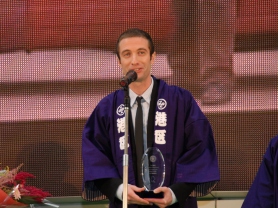
Domo Arigato”
We are so honored to receive this award from the audience here.
We’re very moved and very humbled. We wish to thank the Tokyo International Film Festival, especially all the volunteers who worked so hard.
On our behalf and on behalf of all filmmakers, we’re very grateful to come here and be treated so kindly by everyone. We had such a wonderful time. Thank you so much.
Producer Kevin Tierney
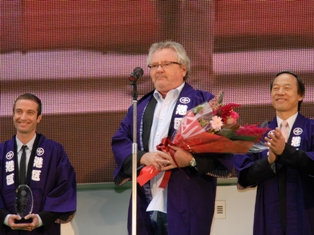
I’d like to echo Jacob’s sentences in extending our gratitude to all of the organizers, programmers and volunteers.
(Addressing the full audience filling the theater.)
I see so many parents and grandparents here with their children, I’m not just a producer of the film, I’m also the father of the director; so I’m doubly grateful! Arigato!

2009.10.24[Event Reports]
Competition section, Eight Times Up: Oct. 21st (Wed) Press Conference
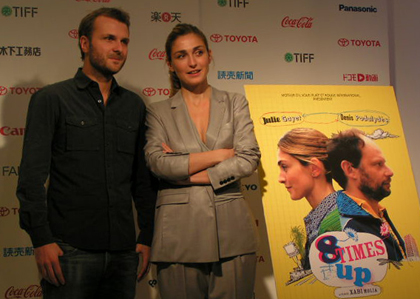
The film depicts the image of a woman who makes the strenuous efforts without giving up, even when she loses both her job and a place to live and experience difficulties repeatedly. She exerts herself like the title of the film which was named after the proverb, “Seven failures then success”!
※The following Press Conference coverage contains the content of the film and elements that refer to the ending of the film.
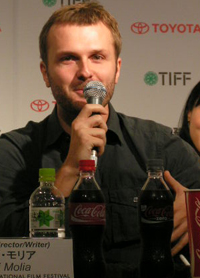
Director Xabi Molia
“I’ve produced a short film few years ago with Julie which became an inspiration to this film. Actually we’ve used that short film as the final scene of our film, but when Julie and I saw that sequence, It really made us feel depressed. We thought we were very different from them. So we decided to keep the characters the way they were and just change the way to tell the story. I’ve read the Director’s Message by The Trotsky’s Jacob Tierney in this year’s TIFF official program book which said, “Setting out to write The Trotsky provoked an identity crisis for me; on the one hand, I wanted to be a Ken Loach and on other hand , I came to realize that I make a very poor Ken Loach,” that’s the same way I felt.(he laughs).”
Within this film which was made into feature, the important character becomes Mathieu, the Elsa’s neighbor.
Director Xabi Molia
“For the role of Mathieu, we wanted to portray him so that his charm would continue to increase, although he wasn’t handsome at all in the beginning. When I was asking who would be a good actor for this part, Julie mentioned to me that she saw Denis 4 days ago; he was wearing a beard and looked very handsome and far-out. Denis hadan established reputation with his comical acting performance in France, but I was uncertain if he fitted for this part. In fact, the scene that he swims in nude is also a sequence in which Elsa becomes attracted to him. That is why I requested him to perform with a serious tone. But Denis replied that it was a first time in his life that anybody told him such a thing! I’m not sure because I’ve never acted that way! “
Julie Gayet
“He is a wonderful actor. I think he is a very sexy person. There are people around me who would deny that, but I think that even if he doesn’t comb his hair, he is still
handsome enough for me.”

“For Elsa and Mathieu, now that they’ve come closer to each other; what will become of their future?” and that’s when the film ends. The question was asked regarding to the ending, whether they were destined soul mates or not. Director Xabi replied, “The film ends with a hint which implies that the romantic love affair is about to happen. Under the normal circumstances, the story like Hollywood movie would follow and the audience will start wondering. But my film is not intended to be a Hollywood movie and the character who is the heroine of the film is not an adequate character for a romantic comedy. She has lots of worries.”
And then Julie Gayet said, “I made a suggestion to make the two of them kiss each
other! But the director said absolutely not,” and showed a regretful but adorable
expression. Director said, “I told her that I’d shoot that kiss if I had some time, but
regrettably I didn’t like the looks of those clouds and refused her request.”(he laughs)
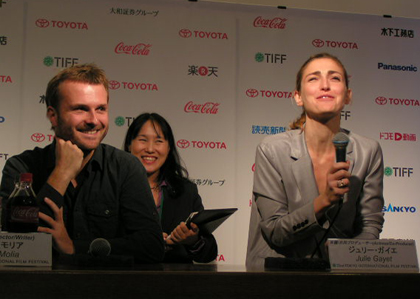
2009.10.23[Event Reports]
Candidate for the Best Actress Awards makes her appearance! Competition section, Stories: Oct.21st (Wed) Q&A + Press Conference
A film screened on 21st (Wed) was Stories, the film from Spain directed by Mario Iglesias. The main character of the film is a middle-aged woman who’s an aspiring novelist which holds the darkness in her mind. The setting of the film, which the five stories that the heroine wrote as a writer, is effectively inserted in to one large story, the film. The elaborate structure is the appeal of this film. Following the screening, the Director Mario Iglesias and the leading actress, Concepción González appeared on stage for Q & A session. They answered the earnest questions by the audience.
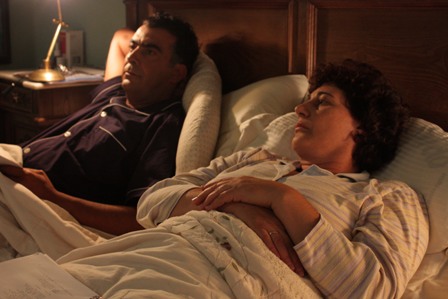
Because the style in which the story was written was with in-depth psychological characterization and realistic portrayal of the event; the question was asked to the director whether, “The film was based on the real story or not?” Director Mario Iglesias answered that “Everything was a fictive writing”. “However, when the fiction (film) is being created, the reality of (the life of the writer) becomes the base of the fiction. In this sense of the word; we could say that the film is based on the real story. And I could also say that since I am an artist in real life; the final scene in my film which the portrait is painted is overlapped with my real life.”
And, “I think that the best lie is a truth. If you continue to realistically elaborate with the camera work and the set decorations, I think it will lead you to a making of a wonderful fiction film. If, for example, I were to shoot a horror film; I think I would continuously shoot the image of the real people. I feel that the reality is the real horror of all,” he said and exhibited his own philosophy about the film making. When he was asked for an advice from a man, who “aspired to become a film director”, he answered, “(With the advance of the technology), film making could be done easily without much money nowadays. There aren’t so many things to learn as a film director. By any means, don’t you wait to become a film director. I would like you to keep continuing to tell the story through the film media,” he mentioned.
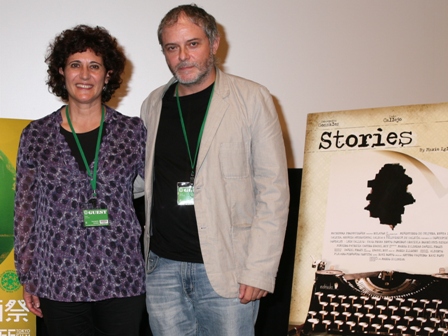
At the press conference which took place at the TIFF movie café after the Q & A, the questions were asked by the participants regarding to the film making style of the Director Mario Iglesias. He also mentioned about his collaboration with the actress, Ms. Gonzalez, who also works as an actual psychological therapist. “Because I was a man, I’ve created numerous spaces in the film script for the actress to be able to make her expressions,“ said Director Iglesias. “’I’ve had numerous opportunities to talk with the Director during the script development. [Why not make this part this way?], I’ve communicated with him using my experiences. That is why I think that the perspective of the psychological therapist is reflected strongly in the completed film,” says Ms. Gonzalez. We were able to take a look at the favorable relationship between the leading actress and the Director. By the way, their relationship began with the street theatrical performance and they have been continuing to create works together for 7 years since then. Ms. Gonzalez made a film actress debut in short film by Director Mario Iglesias and this film will be her first feature film.
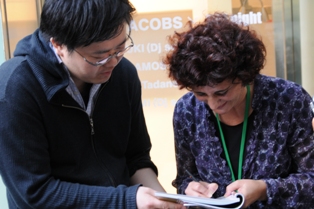
2009.10.23[Event Reports]
Reminiscing Director Yasmin, Winds of Asia – Middle East section, Talentime: Oct. 21st (Tue) Talk Show
The event commenced with the mini-live event featuring the popular musician from Malaysia, Pete Teo, who is the Music Director for Talentime and also late Ms. Yasmin’s close colleague and friend. Picking up the acoustic guitar, he sang the classic song, “Blue” in medium tempo. The song was written upon a theme of “Departing person and those who were left behind” and literally is a song that is appropriate for the opening of this event.
“Yasmin was a person who was pressed for time everyday and to tell you the truth she never came to see my live concerts. It would be nice if she was listening to this song on this day from somewhere out there…." We really felt Pete’s lyrics from our heart.
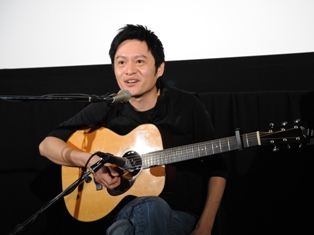
The second part of the event began with the Programming Director Kenji Ishizaka’s host for the Talk Event which took place with the guests who were very close with Director Yasmin.
The first person which expressed her condolence was the Director’s younger sister, Orked Ahmad, You can tell from her name that she was the person who became the inspiration for the character of the “Orked tetralogy” which was performed by Sharifah Amani and Sharifah Aryana, and which began with the Director’s feature debut Rabun (aka My Failing Eyesight). She is a model of that attractive character.
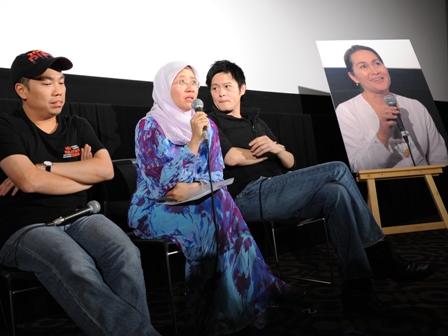
Orked first thanked Director Yasmin in the heaven, their parents, Director’s husband, Programming Director and the film festival officials and then began reminiscing the Director’s memory.
She mentioned that during the production of the Rabun (aka My Failing Eyesight), her father suffered from the diabetes and during the preproduction of the Sepet (aka Slitty Eye) her mother had the heart illness. Nevertheless, she nursed her sick parents and still was able to complete the superb masterpiece. Following the completion of the Talentime, Director Yasmin was in the process of preparing the semi-autographical film, “Wasurenagusa”(literally means forget-me-not), and one another film which was scheduled for its shooting in Singapore.
She also mentioned that it was Director Yasmin’s daily routine to “forgive” anyone who had “hurt her feelings” on that day. If there were anyone here who watched Director Yasmin’s film today and got their feelings hurt, “I wish you could forgive her.” Orked said, “You can forget the name of the Director, but I would be happy if you can remember the aspirations that my elder sister held for the films she made.” She said this with tears in her eyes.
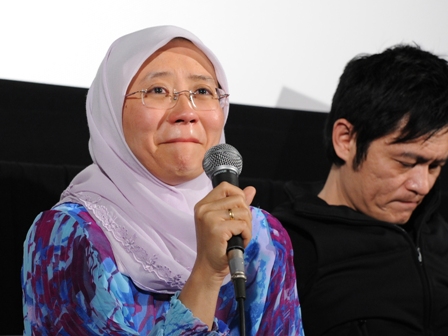
The next person who held the microphone was Director Ho Yuhang who participated in the film festival with his new film, At the End of Daybreak. Director Ho was a regular participant in the Yasmin’s films as ‘an actor’ and on the other hand, Yasmin showed a ‘splendid performance as an actress’ in his films .
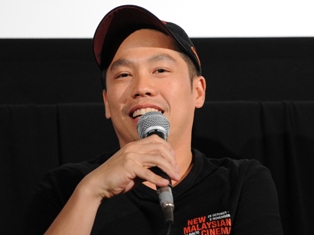
Director Ho and Director Yasmin met through the introduction set up by Low Soon Keong, who is the Director of Photography for the Yasmin’s films. At the time, Yasmin was already well known as the CM director. On the first day they met, Director Ho headed nervously to the place of the meeting place. But Director Yasmin was more nervous than he was; thus they both suffered stage fright during their first meeting. But when Ho realized that “they were alike and were both crazy in a good sense of the word“, they quickly became friends.
But Director Ho and Director Yasmin were both busy and didn’t quite have a time to meet with each other. If they added all the times they have met together; it was only about 1 month in total days that they have spent their time togeather. But we were always communicating over the phone. According to Director Ho, the conversations that they had over the phone was a “laughable talk between the friends”, The half of his telephone bills were charges for the conversations with Director Yasmin.
And following Director Ho, Pete Teo began to talk about his memory of Ms. Yasmin.
Pete and Ms. Yasmin met each other soon after Pete released his first album "Rustic Living For Urbanites", Director Yasmin who was very pleased with the album, wrote her impression on Pete’s blog. This became a motive for Pete to visit Director’s office. Pete watched her Slitty Eyes there, “It was a best movie in 20 years that I have seen!” Pete praised the film but Director Yasmin who’s known to be a shy person behaved modestly. Pete and Yasmin became friends from this day onwards and provided the music for her third film, Gubra (aka Anxiety).
Like Director Ho, Pete didn’t have much time to meet Director Yasmin either, but they continued to communicate with each other leaving short messages in each others cellular phones. Naturally, the things they talked about in their “conversations” were about the topics of Films and Music; however there were times when he received Director Yasmin’s poems in his email.
Within the music that was used in Talentime, the most impressive song was “I Go” that was sang by Mohd Syafie Nsawip in the film. The original version, which Pete Teo sings, was not initially released in Malaysia, due to the certain circumstances. But because of the passionate approach by the Director Yasmin, it was given a second chance as a song for the soundtrack. Director Yasmin asked Pete how he created this song of “departure” and to whom he wrote it for. She asked various questions about the song but “This song was created in merely 5 minutes (as if been driven something),“ says Pete Teo. But he said that he still didn’t have a clear image back then.
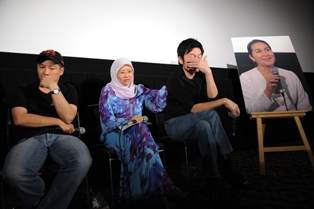
And finally approximately 30 minutes of the event came to the end and “Luckily there are all the feature film prints of Director Yasmin Ahmad stored in Japan. There would be many opportunity that her films will be screened again in future,” Program Director Kenji Ishizaka gave us a joyful message.
We truly hope that the Director Yasmin Ahmad, who makes an imprint on Asian Film History, with her scintillating group of work would continued to be loved by an entire generation.
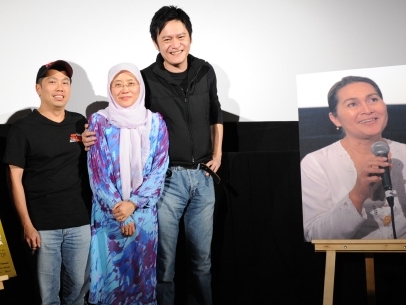
2009.10.23[Event Information]
Green Carpet Club Charity Auction in October 24!!

The theme of TIFF is “Ecology – Contribution to global environment.” As a part of our social action programs, we are running a fund-raising campaign for the environment conservation activities at the festival venues. To extend the campaign, we will hold the charity auction, featuring movie props used in the films screened in 22nd TIFF and others, as well as TIFF original goods.
This auction will be held in cooperation with Rakuten, Inc.. The sales from the auction are to donate to Green Tokyo Fundraising Campaign、Japan-Malaysia Association “Kinoshita no Mori” project, the National Land Afforestation Promotion Organization and Lawson Green Fund, and National Federation of UNESCO Associations in Japan “Mirai Isan” project.
The charity auction event will take place in Roppongi Hills Arena on Saturday, October 24. We are looking forward to your joining the event.
Supported by Rakuten
Venue: Roppongi Hills Arena / TIFFpark
Time: 16:00 - 17:00(Registration starts at 15:00)
Free Admission. Bidding is limited to the participants aged 20 and over.
Part 1 [Introduction of Internet Charity Auction on WEB Rakuten Auction]
The auction goods will be introduced on the TV Asahi Vision next to Roppongi Hills.
You can also join the auction by your mobile.
Part 2 [Charity Auction Event]
Some guests will come to bring their goods for the auction. The guests include the president of jury Alejandro González Iñárritu (Film Director), a jury member Mieko Harada (Actress), Yoo Ji Tae (Actor, Director). Everyone can take part in the auction, and the participants are kindly requested to follow the auction rules.
Note: *The lineup of guests is subject to change.
*Bidding through the website is not available.

*The event may be canceled in heavy weather.
2009.10.23[Event Reports]
Shocking Sexuality, WORLD CINEMA section's, The King of Escape: Oct.20th (Mon) Q & A
After the screening, the audiences were smiling to the Programming Director, Yoshi Yatabe’s remark, “I believe there would be many people here who might have thought they've seen something unbelievable.”
Director Alain Guiraudie, appeared with an eye-catching pink shirt flinging on the black jacket!
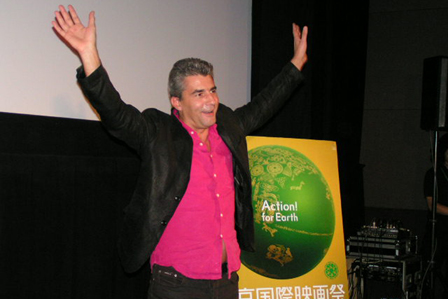
his whole body and saying, “Tokyo Arigato!”
To the question, “Where did the inspiration that surpass the ordinary concept of sexuality come from?“ Director Guiraudie answered that it came from the “personal worries that he had.”
"I aim to somehow connect the small worries that I have with something else and make it entertaining and global to be acceptable as an idea for the film. I also feel that I should fight back against the standardized world of general-interests. I think that people settle for their own ideas on the mental picture of sex; this is so not just in my own country but also in other countries as well. I want to destroy that sort of thing.
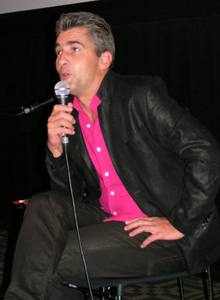
Does the title of The King of Escape imply the idea that “Man is an escaper after all?”
“I just thought that the title could set a Hollywood-type of mood. One of the aspects in the film is that the main character is running away from the pursuers but it also implies the characters identity and idea of escaping from the responsibility,” Director told us about his intentions for the title.
“And what I literally feel about the film that was so The King of Escape about was that the sequence where the main character abandons the poor lady in the roadside,” he said with an upbeat-type of humor.
To the question regarding to the next project, he answered, “I have an idea in my head but it still isn’t in the stage to let you know.” Hearing this, our expectations for Director Alain Guiraudie’s further success grew!
2009.10.23[Event Reports]
Winds of Asia – Middle East section, Wheat: Oct.18th (Sun) Q&A
Following the screening of the feature film, Director He Ping appeared on the stage.
“Over the past years, many of the Chinese films dealt with the subject of war forthright, and depicted its cruelty. I wanted to make a thorough depiction of the story of people who lived in the Period of the Warring States,” said Director He Ping and began the Q & A session with audience who watched the film.
Q.It’s rare to find so many female cast in the period film. How was a mood at the production site like?
Director He Ping”During the war, it was the men who went to the battle and women, elders and the children were the ones that stayed behind at home. The men of Zhao have all gone out to fight the war. The remaining women who held the fort, struggled to guard their houses and lands, even if they didn’t go to the battle themselves. The women were waiting for the war to end and their men to return home. It is truly painful for them. In this film, I put my thoughts in to the women who were trying to survive diligently.”
“Approximately 400 extras have appeared in the film. The women were local people from the rural areas. When one scene of the film was completed, women would go somewhere and disappear until the next scene began! When we searched for them, we found them taking a nap (he laughs). It was a hard work for us to find them to resume our shooting. But they were all charming and naïve. We were able have a very pleasant shooting with them.”
“And they really ate well! Their appetites were two or three times more compared to our appetites. They all ate well and worked well too.”
Q. ”I’ve been a Director He Ping’s fan since 20 years ago when I first watched The Swordsman in Double-Flag Town. When I saw it, I thought it was like Akira Kurosawa’s Yojimbo or spaghetti western movies and found it to be amazing. I felt Kurosawa’s essence in The Swordsman in Double-Flag Town, and the film gave me an illusion of watching the Japanese period piece. Have you ever been influenced by the Director Kurosawa’s film and by the Japanese cinema? .
Director He Ping”It isn’t just me, every director must be getting various influences from some parts of the masterpieces and maybe incorporated the experiences of their predecessors into their work without even realizing it. Through this experience, the directors learn to create something more meaningful for the audiences. Director Kurosawa has once said [he has assimilated traditional things like costumes from China.] China and Japan has something that is common in regarding to the oriental culture.
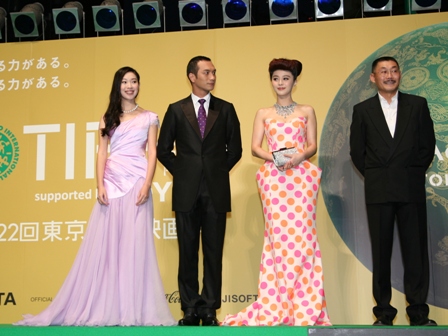
2009.10.23[Event Reports]
Director Skolimowski’s untold story on his masterpiece, BARRIER: Oct. 20th (Tue)
 Introducing the untold story on the masterpiece of the WORLD CINEMA section’s screening film from Jerzy Skolimowski 60’s Best,BARRIER. All the walk-up tickets were sold out immediately partly because the film was a 1966 vintage and rarely had a chance to be screened at the theaters and also that Director Jerzy Skolimowski had made his appearance at the theater. Before the full house audience, the Director told his story on how he began to direct the film.
Introducing the untold story on the masterpiece of the WORLD CINEMA section’s screening film from Jerzy Skolimowski 60’s Best,BARRIER. All the walk-up tickets were sold out immediately partly because the film was a 1966 vintage and rarely had a chance to be screened at the theaters and also that Director Jerzy Skolimowski had made his appearance at the theater. Before the full house audience, the Director told his story on how he began to direct the film.Director Jerzy Skolimowski:
“While I was working as a scriptwriter writing scripts such as Innocent Sorcerers (1960) for Andrzei Wajda and Knife in the Water (1962) for Roman Polanski; there was an opportunity for me to write a script which would become the base for the film, BARRIER. It was being directed by a different director, but that person withdrew from the production in the midst of the shooting because he didn’t want to shoot that sort of film”.
“That was when the Producer of the film told me to take his place and continue directing the film. When I tried to refuse, he asked me whether I didn't want to shoot the film because the script was badly written and also told me the reason why we couldn’t stop the production was because we were operating with the funds provided by the country. That was how I came to assume the direction of that film.”
“My favorite scene in the film that I shot through the trial and error was the opening scene. That is why I would be extremely honored if you can view the opening scene of my film and recall the story that I have told you.
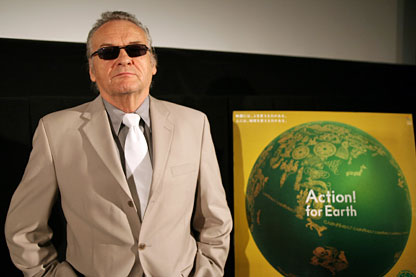
2009.10.23[Event Reports]
Competiton section, Rabia: Oct. 18th (Sun) TIFF movie cafe Press Conference

Rabia is a film that depicts the “long-distance” love affair about a man who hides in the attic of a rundown mansion where his girl friend works as a housemaid.
Director Cordero who had his original screenplay of previous film praised by the Sundance Film Festival was “drawn by the original story” and adapted it in to the screenplay.
Prior to the adaptation of the original story, “I didn’t want the viewer to discover the outcome of death by the title,” said the Director. That is why there were some changes made in the setting.
Director Cordero mentioned about Gustavo Sánchez Parra, the leading actor, “I’ve only made the communication with him over the phone prior to the shooting. He is an honest actor and made preparations for the role while recalling about his own experience. He made himself solitary by communicating with people only over the phone. He only slept 2 hours to make himself look weary and lose spark of life from his eyes.

When the question was asked on “How he made the preparation for the main character getting thin in the film,” he unveiled the inside story by telling us that, “We made 4 months of preparation for losing weight and gained the weight back in 7 weeks.”
The release of the film is already fixed in Columbia, Mexico and Spain. “It should be released in Japan too,” he mentioned his desire and exited the venue.

Message from Director Sebastián Cordero
2009.10.22[Special Contents]
Feel the Wind Special Interview

Special Interview














